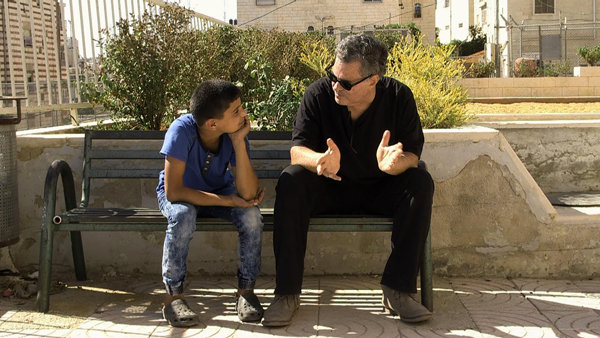Amos Gitai’s new documentary marks 50 years of Israel’s occupation of the West Bank and 25 years since he completed his critical trilogy, House (1980), Wadi (1981), and Field Diary (1982). These films became so controversial that he left the country until the Oslo Accord promised peace. He searches for evidence of hope for the future in this update, which chronicles his interviews with predominantly liberal Israeli politicians, journalists, and activists in civic organizations, all of whom work to bridge the gap the government won’t cross.
Gitai opens and closes with clips from his 1994 interview with Yitzhak Rabin, whose 1995 assassination he obsessed over in Rabin, The Last Day (2015). But even this brief clip reveals Rabin’s ability as a statesman, “Peace can be made even with the toughest enemies. Otherwise, it’s only about violence.” Gitai also includes interviews from 1884 in Gaza, where Palestinian men complain that they are no longer allowed to work in Israel and members of Hamas dismiss Arafat. They insist there can be no peace until all Hamas supporters are released from prison.
In the newer footage, the politicians and journalists are presented by name and title or affiliation, though with little context for an American audience. Tzipi Hotovely, a right-wing Orthodox Jew who serves in Prime Minister Benjamin Netanyahu’s Likud Party as deputy minister of foreign affairs, appears almost unable to stop ranting about international misperceptions to answer Gitai’s questions. She insists, “We’re not occupying our own land.” Tzipi Livni, a member of Parliament (Knesset) and former minister of foreign affairs, is now in a split-away party, Hatnuah. Tamar Zandberg, a Knesset member with the leftist Meretz Party, strongly supports the method of practical negotiations with Palestinians and objects to the idea that the government is virtually erasing the 1967 border.
The only journalist unaffiliated with the liberal press is Ben-Dror Yemini with Yediot Aharonot, the largest Israeli daily newspaper. He leans against Netanyahu, but he is frustrated with peace efforts, stating, “Every time there are serious peace plans, the Palestinians always refuse. They don’t want two countries!”
The other journalists are affiliated with left-of-center Haaretz. Ari Shavit, author of the 2013 best seller, My Promised Land: The Triumph and Tragedy of Israel, and who later resigned as a result of sexual misconduct allegations, rues that liberals are “traumatized by failures of the peace process. Rabin has no heirs.” Gitai asks editor-in-chief Aluf Benn to explain the issues, but Benn’s comparisons to how Belgium and Canada handle two competing ethnic and religious populations are confusing, leaving the viewers perplexed.
Columnist Gideon Levy takes Gitai along on a routine visit to the West Bank, where he and his photographer try to portray the Palestinians as individuals, rather than just statistics. Despite their inability to speak Arabic, the three seek out the human interest angles. (It’s noted that the only contact young Palestinians have with Israelis is with gun-toting soldiers or police.) Gitai accompanies the journalists to Hebron, and he initiates a discussion about Rabin’s legacy. It’s immediately pointed out that the politician’s assassin was a settler. Gitai also asks a boy, through a translator, about his dream for Hebron. The boy’s answer is firm, “I wish to die a martyr.”
In Ahmar on the West Bank, the parents at the Bedouin School Khan Al express their frustrations toward the Israeli government, as their reasonable requests for assistance, such as buses, have been consistently denied. Even worse, the government is threatening to demolish the school altogether, because of complaints that it poses a risk to the settlers. Additionally, Gitai meets two female Orthodox settlers who recount their experience with a knife attack by a Palestinian. Nevertheless, the wounded woman insists that co-existence is possible.
More than 20 years later, Rabin appears correct in his warning of the forthcoming risks to stability in moderate Arab regimes. He cited causes such as Islamic extremism and growing extremism among the Palestinians as the culprits. Unfortunately, Gitai’s approach feels dated, as he focuses on the Oslo accords as a solution, and too narrow in just dealing with the West Bank. There’s no reference to the Arab Spring, the impact of the Syrian Civil War, or Palestinians exiled in Jordan and Lebanon since 1948 (under the United Nations Relief and Works Agency for Palestine Refugees in the Near East that is now a flashpoint in U.S. international relations).
Ever the liberal optimist, Gitai closes on a program that encourages Israelis and Palestinians to share Middle Eastern culture, with a backgammon tournament and concert, a conclusion that comes across as naively quaint.

















Leave A Comment